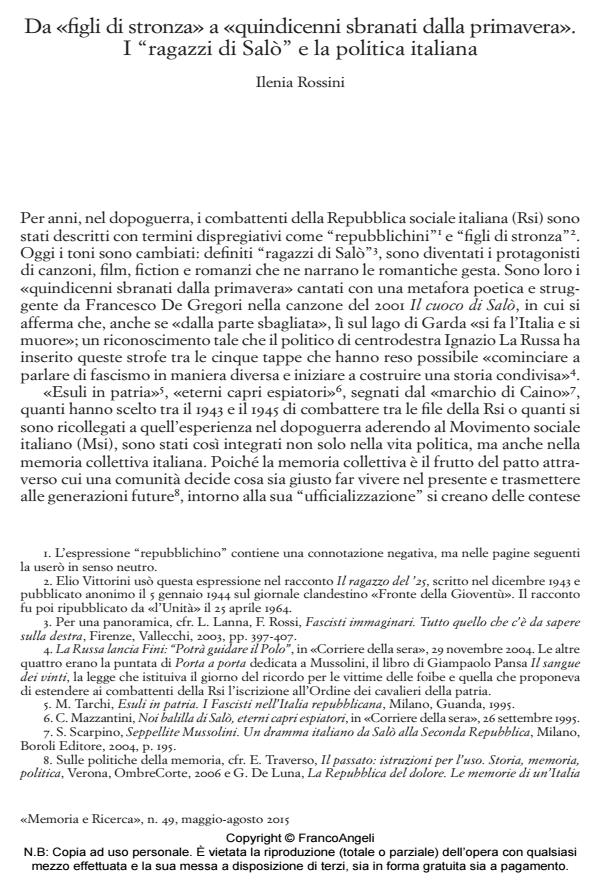Da «figli di stronza» a «quindicenni sbranati dalla primavera». I "ragazzi di Salò" e la politica italiana
Titolo Rivista MEMORIA E RICERCA
Autori/Curatori Ilenia Rossini
Anno di pubblicazione 2015 Fascicolo 2015/49
Lingua Italiano Numero pagine 19 P. 125-143 Dimensione file 110 KB
DOI 10.3280/MER2015-049009
Il DOI è il codice a barre della proprietà intellettuale: per saperne di più
clicca qui
Qui sotto puoi vedere in anteprima la prima pagina di questo articolo.
Se questo articolo ti interessa, lo puoi acquistare (e scaricare in formato pdf) seguendo le facili indicazioni per acquistare il download credit. Acquista Download Credits per scaricare questo Articolo in formato PDF

FrancoAngeli è membro della Publishers International Linking Association, Inc (PILA)associazione indipendente e non profit per facilitare (attraverso i servizi tecnologici implementati da CrossRef.org) l’accesso degli studiosi ai contenuti digitali nelle pubblicazioni professionali e scientifiche
Immediately after the Second World War and the end of the Italian Civil War, Italy was interested by a phenomenon of "divided memories". On the one hand there was the official public memory, which denied combatant qualification to soldiers who had fought in the army of the fascist Italian Social Republic (Repubblica sociale italiana, RSI) and condemned their experience; on the other hand there was the neo-fascist memory which inherited the political, cultural and ideological values of RSI soldiers and put all the efforts to legitimize them through their inclusion in public memory. Over the decades, this neo-fascist struggle over memory has had partial success: the negative image of the Italian Social Republic soldiers went weakening and the previously disparagingly labelled "repubblichini" became the subjects of moving and romantic songs, movies and fictions. Now called "ragazzi di Salo" ("Salo boys"), they were integrated in the Italian collective memory and started to be represented as people who made choices in good faith to defend their homeland and honour. Although the attempts to legislatively equate the fascist and anti-fascist (partisans) fighters as combatants have not been successful, the new rhetoric about "Salo boys" has penetrated deeply into Italian collective memory.
Parole chiave:Italian Social Republic; RSI Military Formation; Italian Civil War; fascist legacy; memory politics; veterans.
Ilenia Rossini, Da «figli di stronza» a «quindicenni sbranati dalla primavera». I "ragazzi di Salò" e la politica italiana in "MEMORIA E RICERCA " 49/2015, pp 125-143, DOI: 10.3280/MER2015-049009